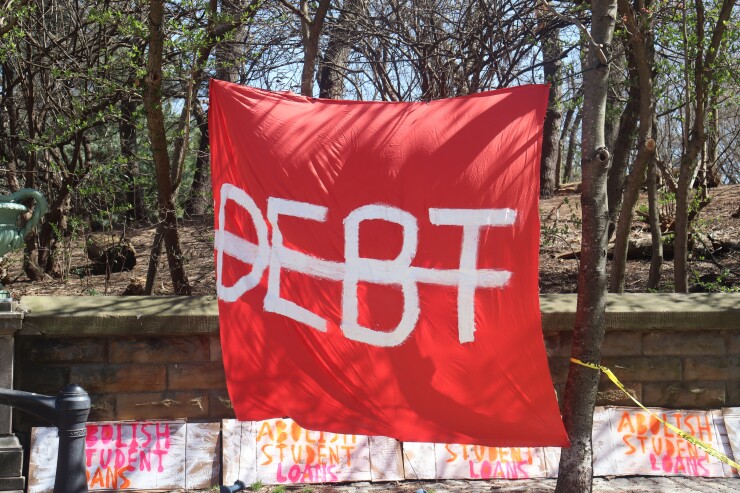
Political one-liners that target legitimate debts owed to private creditors and health care providers sound great — but are they doing more harm than good?
Over the past year, the White House has targeted "junk fees" — fees that cover businesses' legitimate expenses — supported the forgiveness of student loan debt even for those who can pay and worked with federal agencies to suppress credit reporting of debts owed in the health care, student loan and housing spaces.
All of this sounds good on paper, unless of course you are a medical provider in a rural and underserved area who relies on payment for services to keep the doors open so those patients can be seen.
Or a housing provider that needs reliable credit information to provide safe and affordable housing, as well as a financial return to ensure you can continue to provide that housing.
Or an education provider.
While the CFPB seems poised to overstep its legal authority on issues like rewriting the Fair Credit Reporting Act (a decision for Congress, not a federal agency), there are even bigger problems at the regulatory level.
The bureau's message behind the message is that certain debts don't need to be repaid.
For example, CFPB Director Rohit Chopra has said in congressional testimony that he supports no credit reporting of medical debt:
"When it comes to accuracy of furnishing credit reports, that is an incredibly important responsibility for the enforcement agencies, the states and others," Chopra said in discussion with U.S. Rep. Ralph Norman, R-S.C., in a House Financial Services Committee this spring.
Norman asked Chopra about the CFPB encouraging furnishers to provide inaccurate information about legally owed debts (by not furnishing it at all).
Chopra sidestepped providing an answer. He instead would only address fake or inaccurate debts. He would not answer how the bureau has authority to encourage suppressing legally owed, legitimate debts.
Chopra said the bureau is focused on reasonable procedures to ensure accurate reports under the FCRA. He admitted that the statute is for Congress to change.
Congress agrees and has long-standing and effective mechanisms in the FCRA to ensure that credit reports are accurate. And, if they are not, consumers have the legal right to dispute their accuracy.
So, what is the CFPB really trying to do other than target medical debt? What's the next industry it has an ideological target on and thinks should be treated differently in the credit-based economy?
Maryland is the latest state to decree that employer-sponsored EWA products aren't loans, but the battle over how they will be regulated is just beginning, experts say.
Student loan servicing and collections certainly appear to be on the list.
The Department of Education (DOE) is instituting a 12-month plan for borrowers whose payments will resume this fall, according to a
Americans are being bombarded with confusing public messaging about whether they still need to pay legally owed debts such as medical bills and student loans.
When they hear the White House refer to some of their owed payments as "junk," they are understandably uncertain about whether they really need to pay those bills.
For example, a group called the Debt Collective is encouraging college graduates to strike against their student loans. The group contends that the goal of the strike is not to negotiate with the DOE, but for borrowers never to have to pay student loan debt again.
According to a
My question is what will happen to the group's followers who are not in the "for the most part" category? When the time comes to pay their student loans, they will likely suffer financial harm if they do not work with informed servicers or collectors on a payment plan or other workable means to manage their debt.
The CFPB seems to forget that it has a responsibility to look out for all consumers — and taking actions that increase costs for everyone, or decrease access to credit for everyone, is not part of its mission.
Unfortunately, these realities are not often discussed because it's more politically powerful to be against paying your bills. However, the reality is that it's not some giant Wall Street corporation — as portrayed by politicians — that is harmed by the rhetoric. It's the local physicians' practice and their patients, or it's the low-income families in need of affordable housing who were relying on the investor to build the next unit.
There are incredibly more effective ways to solve these problems than by being politically expedient and perpetuating false narratives. Focusing on debt that's already been incurred usurps time and energy that should be spent on the front-end to find ways to bring down the cost of housing, health care and education.
The accounts receivable management (ARM) industry is instrumental in keeping America's credit-based economy functioning with access to credit at the lowest possible cost, thereby protecting one of the safety nets that protects the most vulnerable consumers in society from unplanned expenses. The effects of multiple years of high inflation have left family balance sheets depleted, fragile and much deeper in debt — and now facing less cash flow from higher interest costs.
In 2018 the ARM industry returned over $90 billion to creditors for goods and services they had provided to their customers. This in turn benefits all consumers by limiting increases to the costs of goods and services to make up for the losses — limiting inflation.
To address my earlier question, Americans are not better off when they "strike" against their debt. They risk financial harm while also increasing costs for Americans who do address their legal obligations.






